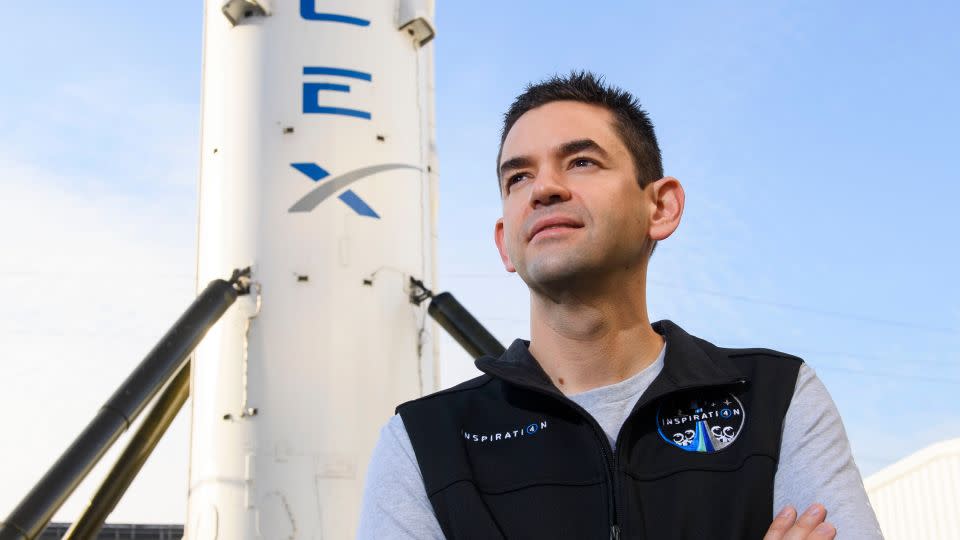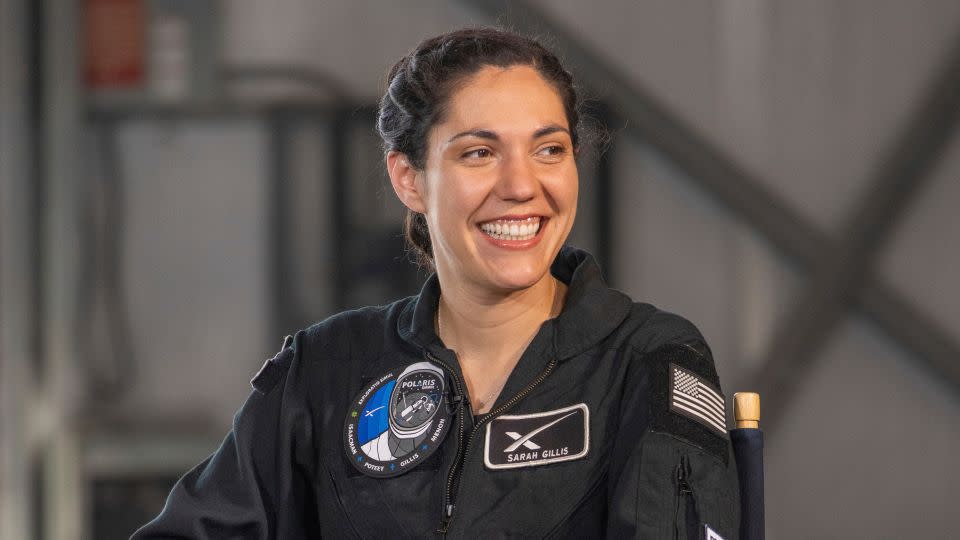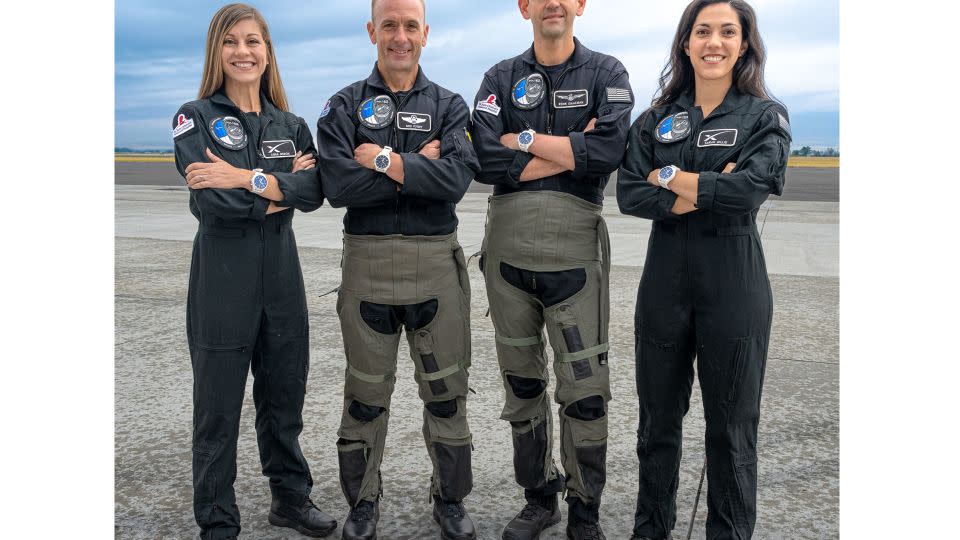Sign up for CNN’s Wonder Theory science newsletter. Explore the universe with news on fascinating discoveries, scientific advancements and more.
SpaceX’s latest attempt to push the cosmic boundaries is set to kick off this week with a mission called Polaris Dawn: a nail-biting, five-day trek to orbit with a crew of private astronauts traveling into Earth’s radiation belts and hoping to conduct the first commercial spacewalk.
The mission is slated to take off from NASA’s Kennedy Space Center in Florida between 3:38 and 7:09 a.m. ET Tuesday — after previous attempts to launch in late August were delayed — carrying four civilians on the daring excursion.
It will mark the second trip to space for Jared Isaacman, the billionaire founder of payments platform company Shift4. He made a less risky journey in 2021 on a mission dubbed Inspiration4.
Polaris Dawn is one in a series of missions that Isaacman plans to carry out alongside SpaceX — three flights aiming to test new technologies that can help advance the Elon Musk-led company’s goal of seeing humans live and work on other planets.
Joining Isaacman on Polaris Dawn will be two SpaceX engineers, Sarah Gillis and Anna Menon, the first from the company to join a mission to orbit. Scott “Kidd” Poteet, a former United States Air Force pilot and longtime friend of Isaacman’s, rounds out the crew.
Members of the crew come to the mission with extensive experience piloting jet aircraft — a common career before becoming a professional astronaut — or have worked with and trained NASA astronauts, as is the case for Menon and Gillis.
Risky business
After takeoff Tuesday, the four-person team is expected to travel into an oval-shaped orbit that extends as far as 870 miles (1,400 kilometers) from Earth — high enough to plunge the vehicle and crew into the Van Allen radiation belts. No human has traveled so far into space or passed through the radiation environment since NASA’s Apollo program.
The Polaris Dawn mission will also aim to reach the highest orbit around Earth for a crewed mission — with eyes on surpassing the 1966 record set by NASA’s Gemini 11 by 20 miles (32 kilometers). The latter reached 853 miles (1,373 kilometers) nearly 60 years ago.
Menon and Gillis would also become the first women to make such a journey.
Almost immediately after launch, the crew will begin preparing for a high-risk spacewalk, making use of Extravehicular Activity, or EVA, suits that SpaceX developed in just 2 ½ years. If successful, the spacewalk, which could take place early Thursday, would mark the first time that civilians (or nongovernment astronauts) have carried out such an endeavor.
The quartet is then set to focus on roughly 40 science experiments before the SpaceX Crew Dragon capsule steers itself back toward Earth. As with any mission to space, reentry is expected to be dangerous — with pressure and friction heating the spacecraft’s exterior to more than 3,000 degrees Fahrenheit (1,649 degrees Celsius) — before the spacecraft free-falls toward the ocean and deploys parachutes to slow its descent.
The mission is expected to last about five days. Here’s a closer look at its four crew members.
Jared Isaacman: ‘Ambitious objectives’


As one of the instigators of the Polaris Dawn mission, Isaacman had a hand in selecting the crewmates that would travel alongside him. And this team is distinct from the one that accompanied Isaacman on the Inspiration4 mission nearly three years ago.
That mission brought along people from all walks of life, including a cancer survivor, an artist, and the beneficiary of a raffle. Inspiration4 — the first commercial spaceflight mission for SpaceX — sought to prove that humans from various backgrounds could train for and execute a flight in orbit. The four-member crew spent three days in space, lapping planet Earth.
But due to the experimental nature and risks associated with Polaris Dawn, Isaacman said this mission required a different approach.
“I think you build a crew for your mission objectives. The objective for Inspiration4 was to inspire people to do things differently than how it had been historically done at NASA. For what was largely like a random process, everybody so exceeded my expectations,” Isaacman told CNN.
“But Polaris is a test and developmental program — and that appeals to my aviation background and things we’ve done in the past,” he added. “It’s set out (to) have ambitious objectives. So, you assemble the best crew you could for it.”
Anna Menon: A lifelong dream


Isaacman already knew Menon from the Inspiration4 mission: She was a technical adviser to the family members of that crew, explaining the complexities of spaceflight to loved ones on the ground.
Months after Inspiration4 came back to Earth, she learned that Isaacman was planning his return.
“I found out about it through a meeting that was put on my calendar. … I suddenly start to feel like this is not the average meeting (and) very quickly, Jared asked if I would like to go on his next mission,” Menon said. “I was just completely surprised. Absolutely never would have seen this coming in my entire life.”
But Menon said she has longed to travel to space, which captured her imagination during a trip to Johnson Space Center in Houston as a fourth grader.
“I got to experience a day in the life of an astronaut and a mission control and flight controller,” she told CNN. “And from that time on, I did dream of having that opportunity.”
Menon’s passion led to a master’s degree in biomedical engineering from Duke University and a seven-year stint at NASA, working as a biomedical flight controller for the International Space Station.
After switching to a role at SpaceX, she served in mission control during some of the company’s highest-profile missions, including 2020’s Demo-2 — the inaugural crewed flight of SpaceX’s Dragon capsule that returned astronaut launches to US soil for the first time in a decade.
Still, Menon told CNN, she did not anticipate traveling to space.
“I think I very much recognized the odds were extremely low,” she said. “And I probably, if I’m honest with myself, had written it off.”
But spaceflight now appears to run in the family. Just days before Menon learned she would join the Polaris Dawn crew, her husband — Anil Menon, who also worked with the Inspiration4 crew as a SpaceX employee — was selected as a NASA astronaut. (He has not been assigned to his first mission.)
“It was an absolute whirlwind of a week in our household,” Anna Menon said. “I called him up right after I got out of the meeting with Jared, and I just remember his reaction being extreme shock and such excitement — over the moon excited.”
Their two children, now 4 and 6 years old, have watched as their parents trained to take on risky challenges. Menon said her eldest is just beginning to grasp the gravity of the situation.
Menon also coauthored a book for them, called “Kisses From Space,” that she plans to read aloud during the mission as part of a fundraiser for St. Jude Children’s Research Hospital.
Menon will be a mission specialist during the Polaris Dawn flight, helping to carry out science experiments during the trip, and she’ll be the mission’s medical officer.
If space adaptation syndrome — a type of severe motion sickness that can strike astronauts — hits the crew, it will be up to Menon to administer medication that can alleviate those symptoms.
Sarah Gillis: From intern to astronaut


Dealing with — and searching for answers to — the daunting biological challenges that humans face while floating in a spacecraft is another cornerstone goal of the Polaris Dawn mission.
Some of this mission’s science experiments are geared toward a better understanding of space adaptation syndrome and predicting whom it will affect.
As a lead operations engineer at SpaceX, Gillis has taken the reins on training astronauts for crucial missions. Among her trainees were the first astronauts to fly in a Crew Dragon capsule — NASA’s Bob Behnken and Doug Hurley — before the historic Demo-2 mission in 2020.
Gillis also trained the Inspiration4 crew for its 2021 mission, and she saw firsthand how spaceflight can take a toll.
Isaacman has said two of the crew members on Inspiration4 experienced space adaptation syndrome (about 1 in 2 people do), and there were issues with the Crew Dragon toilet that threatened the team’s comfort during its 3-day trip.
“I’m really, really interested to see how (being in microgravity) goes for me and what I learn and bring back to the training program at SpaceX,” Gillis told CNN.
Like Menon, Gillis was shocked to learn about possible space travel during a meeting that popped up on her calendar in late 2021.
“It was a pretty wild, random workday,” Gillis said, “but I think my immediate response was, ‘Hell yes.’”
During her career at SpaceX, where she has worked for nearly a decade, Gillis helped develop the company’s Crew Dragon operations process and has been close to the sidelines of human spaceflight.
Despite her proximity to those missions, however, Gillis said she never imagined she would fly aboard the capsule to which she has dedicated much of her professional career.
“I think human spaceflight captivated my imagination, and that’s why I tried to pursue things that interested me in that field,” she told CNN. “(But) I don’t think in any of this, I considered it was possible.”
Gillis did not grow up dreaming of cosmic adventures. She’s a trained violinist who did not seriously consider a career in space until her junior year of high school, when she met NASA astronaut Joe Tanner. He helped her with a senior project and encouraged her to pursue engineering in college.
“I ultimately applied for aerospace engineering at (the University of Colorado Boulder) because of that,” she said, “and ended up down this whole journey of becoming an intern at SpaceX, and then, many years later, getting to fly on the spacecraft.”
Gillis and Menon have spent the last several years splitting time between their day jobs at SpaceX — leaving their fingerprints on the hardware that will carry them to space — and training for the Polaris Dawn mission.
“Now, I would say, over the last couple months, we’ve transitioned to full-time crew members,” Gillis added.
Scott ‘Kidd’ Poteet: ‘Zero reservations’


Poteet has been along for the ride throughout Isaacman’s pursuit of space ambitions.
Their friendship stems from experiences in the air: Poteet spent 20 years in the Air Force, racking up about 3,200 hours of jet flight experience. And Isaacman is a passionate pilot with thousands of hours of experience flying jets and experimental aircraft.
Poteet went to work for Isaacman after meeting him at an air show. Poteet joined Draken International, a tactical fighter aircraft supplier and contractor for the US military that Isaacman founded in 2012.
Draken provided a “bad guy” service, Poteet said, using jets to role-play as enemies during military training. It commercialized a role that Poteet had also played in the Air Force.
That experiencelasted about five years, Poteet said, before Isaacman sold the company.
Since Isaacman shifted focus spaceward, he and Poteet have been in lockstep. During Inspiration4, Poteet was the mission director. But Poteet said he did not imagine a ride to space would be within his grasp.
“I was not the best academic student growing up — grade school through high school,” Poteet told CNN. “But I admired all the astronauts and the NASA programs: Mercury, Gemini, Apollo leading up to the shuttle era.”


But as a former operational test pilot, Poteet said he understood Isaacman’s desire to push boundaries and help SpaceX take ambitious leaps forward in its commercial spaceflight capabilities.
“Similar to (SpaceX CEO) Elon (Musk), Jared has got visions of: How do we continue to push the envelope and move the needle on space exploration?” Poteet said. “The end result was the Polaris program.”
“I was a firm believer in what (Isaacman) had envisioned,” Poteet added.
The Polaris Dawn mission came together in 2 ½ years, breakneck speed as far as aerospace timelines typically go.
Poteet said that this mission shows what the SpaceX team can “accomplish in a very short few years (and) is a true testament to its professionalism.”
“I have absolutely zero reservations,” Poteet said about making his foray into space. “I have full faith and confidence that they’ve crossed every ‘T’ and dotted every ‘I’ in preparation for our mission.”
For more CNN news and newsletters create an account at CNN.com




